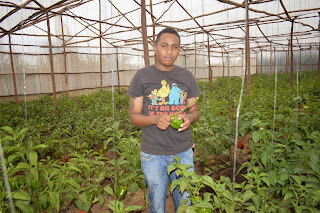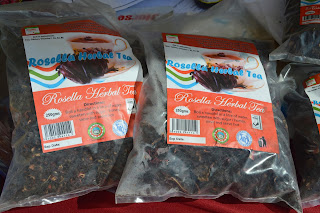A new breed of graduates is realizing that the
elusive white collar job is not worth chasing after all. This crop of
young energetic entrepreneurs have their eyes on good money and salaries will
not give them that. They have turned to agriculture.
The lingo of making a decent income
is now old fashioned. The new lingo is banking big from agribusiness. Integrating
traditional agriculture with new technology is the tool young graduates are
using to make a tidy sum of money. These entrepreneurs are using knowledge
gained from various courses at the university to create innovative products and
add value to the existing products. The focus is on good agronomic practices to
produce high quality yield.
John Maingi, 24 years old, is one
entrepreneur with his eyes on the agricultural value chain. He identifies gaps
in the value chain and creates products to fill those gaps. The IT graduate
from USIU is the founder and director of Foods Africa Enterprises. The company that I would
like to call a one stop shop for all your agribusiness needs.
 |
| John Maingi, Founder and Director of Foods Africa Enterprises |
If you have money and no land or time,
John and his team will sell agribonds to you. If you have land and no idea
where to start with farming, John will offer consultancy. Or perhaps you
started your project and you are stuck half way, Foods Africa Enterprises will
bring you back on track. Maybe you need seedlings, fertilizer or farm
equipment, John is your guy.
The
innovator of agribonds
I first met John Maingi at the annual
Agri-Pro Focus Network
Day in Nairobi. He was exhibiting his company’s products and the term agribonds
caught my attention. I had to probe further being the blogger I am.
“Agribonds is a new product in the market.
It target executives in the corporate world who have the money but no time
and/or no land to get into agribusiness” explained an enthusiastic John.
In a nutshell, you give Foods Africa
Enterprises your money, they invest it for you and bring you the profit. That
is typically growing your money without moving a muscle. For instance, if you
have Ksh. 100,000, you schedule a meeting with Mr. Maingi and his team. At the
meeting you will be advised on the best crop to grow depending on the season
and market. After agreeing on how to share profits, the work begins. Foods
Africa takes care of land hiring, seeds, water, harvesting and even
selling. They keep you updated on the
whole process and email you details of expenditure. After harvesting, you get back
your initial capital and a profit.
Agribonds is just one of the
innovative products that Foods Africa has in its array of innovative products.
John and his team process and package pure honey from Kitui. They supply
chicken, rabbit meat, turkey and, quail eggs and meat. They also supply fresh
high quality cereals and vegetables to Veg Pro, Nameelok Group of Hotels, Fresh
and Juicy among other companies.
 |
| Foods Africa emphasizes on high quality produce |
Quality is uncompromised at Foods
Africa. John has quality control team at his company that ensures each produce
is of the best quality. I noticed John’s keen eye and attention to quality when
we were at one of his client’s green house project in Ruai, where I conducted
the interview for this post. In the middle of the conversation, John would
reach out for a capsicum tree and comment about the leaves and flowers. He
would quickly identify areas of the green house that required more attention.
He can easily pass for an agronomist with his easy interaction with crops. He
tells me he has learnt all he knows about crops out of interest.
Humble
beginnings
Foods Africa Enterprises is 5 years
old. It was conceived in 2009. John set up a small green house at his home 5
years ago. The project was a success and that pushed him to expand the green
house. Soon John’s neighbours were interested in green house farming and they quickly
picked it up. In no time, there was too much produce and no market or at times
the market was flooded.
Entrepreneurship is about
strategically positioning a service or product once opportunity strikes. John realised
that a link was missing between farmers and the market. He started collecting
produce from neighbouring farmers to increase his yield and supplying it on
large scale. The demand for produce grew and he had to supply beyond his
neighbourhood to other regions in Kenya. It became necessary at this stage to
operate a business entity as opposed to operating as an individual. That is how
Foods Africa was born.
Entrepreneurship
is all about strategy
 |
| Mr. Maingi attending to one of his clients, Ms. Linda Atambitsa |
“You’ve got to think outside the box,”
is a phrase that John kept quoting during the interview. He has mastered the
art of packaging products and services that are market oriented.
For instance, there is an avalanche
for quail farming at the moment. These farmers require cages, licences,
incubators, fertilized eggs or chicks to get started. Foods Africa provides
these products and also trains new farmers on how to rear these valuable birds.
As the director of Foods Africa Enterprises, I gotta say, John Maingi has a knack
for thinking outside the box.














